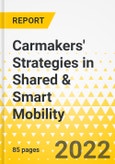Learn about the leadership status of players in Shared, Autonomous & Connected Mobility
Learn about the strategies and roadmaps of leading carmakers in ride-hailing, car-sharing, micro-mobility, EV charging among other business models.
Understand how the dynamics of Mobility-as-a-Service will evolve by 2030 in China, Europe and the USA.
Understand how carmakers are positioned in Smart and Shared Mobility across 10 business models:
- B2C & P2P car-sharing, free-float and station-based
- Taxi/P2P ride-hailing, incl. electrified fleets
- Automated Mobility On Demand (AMOD_/robotaxis
- Micro-Mobility (e-bikes, e-scooters, other)
- Multi-modal transport (e.g. Moovel)
- Connected parking (e.g. Park Now)
- Electric vehicle charging, such as VW’s Elli
- Online car sales and subscription services
- Urban Air Mobility investments & strategies
- Other Aftersales services (e.g., predictive maintenance, battery swapping, etc.
Online car purchases fuelled by e-commerce rise, enabling tech for a better shopping experience & COVID-19 impact.
The pandemic is pushing carmakers and auto dealerships to rethink their digital retail channels and accelerate their online e-commerce offerings.
At the same time, COVID-19 is acting as a catalyst for more consumers to turn to online purchases including vehicle sales. According to McKinsey’s recent survey, consumers are now more interested in contactless shopping services and among them, more than two-thirds of the younger consumers prefer online car shopping instead of visiting dealerships.
Online share of total retail sales historically rises as an increasing proportion of consumers tends to search, compare and eventually shop online.
The challenges and the purchasing criteria of today’s connected customers evolve continuously and differ from previous times. Product specification, device interoperability.
Connectivity, Content/service availability affect personalised shopping experiences.
In this direction, major carmakers have recently started collaborating with digital retail providers in order to digitalise their sales platform (and/or their dealerships platforms) and enhance consumers’ accessibility to online vehicle sales.
A recent example is Tekion’s EV-focused retail software for General Motors’ dealers. Tekion will provide GM dealers with its retail management software that will make it easier to purchase Chevy, Cadillac, Buick or GMC EVs.
Car sharing and ride sharing are two of the forms of transportation that have attracted a lot of interest and investment since the remaining types are highly fragmented.
Leading carmakers are racing to position themselves to take advantage of new opportunities and compete with new entrants.
Daimler’s with Car2Go leads B2C Car sharing and in 2019 announced a deeper strategy shift to focus on mobility with its restructuring. Also, it has announced an alliance with BMW Group to merge their business units and offer customers a single source of urban mobility. Each company will hold 50% of the new joint venture.
Table of Contents
Companies Mentioned
- Audi
- BMW Group
- Bosch
- Ford
- General Motors
- Honda
- Hyundai
- Jaguar
- KIA
- Mercedes-Benz
- Mitsubishi
- Nissan
- Porsche
- Renault
- Stellantis
- Tesla
- Toyota
- Volkswagen
- Volvo








